In the realm of spirituality and faith, the concept of Nazar Ki Dua in hindi holds profound significance. Originating from Islamic tradition, Nazar Ki Dua is a supplication seeking protection against the malevolent effects of the evil eye. In this comprehensive guide, we delve into the depths of this ancient practice, exploring its origins, significance, and methods of implementation.
Nazar ki Dua In Hindi
Nazar ki dua (नज़र की दुआ) का अर्थ है “बुरी नज़र से बचने की प्रार्थना।” यह माना जाता है कि ईर्ष्या या बुरे इरादे से किसी को देखने से नकारात्मक प्रभाव पड़ सकता है। इस दुआ को पढ़ने से अल्लाह की हिफाजत प्राप्त होती है और बुरी नजर से बचा जा सकता है।
Nazar ki Dua in English
The Evil Eye, or Nazar, is a concept in Islam that refers to the belief that someone’s jealous or envious gaze can bring misfortune. Muslims recite a specific dua, a supplication or prayer, to seek Allah’s protection from the Evil Eye.
Here is the Nazar Dua in Arabic and English translation:
- Arabic: أَعُوذُ بِكَلِمَاتِ اللَّهِ التَّامَّاتِ مِنْ كُلِّ شَيْطَانٍ وَهَامَّةٍ وَمِنْ كُلِّ عَيْنٍ لَّامَّةٍ
- English: “A’udhu bi kalimat-Allah il-tammah min kulli shaytanin wa hammah wa min kulli ‘aynin lammah”
This dua translates to:
English: “I seek refuge in the perfect words of Allah from every devil and poisonous reptile, and from every envious evil eye.”
Nazar ki Dua text
The concept of the evil eye, or “nazar” in Arabic, is present in many cultures around the world. It refers to the belief that someone’s jealous or envious gaze can bring misfortune. In Islam, there are specific prayers, called duaa, recited for protection from the evil eye. Here’s one of the most common Nazar ki Dua:
Dua:
أعوذُ بِكَلِمَاتِ اللهِ التَّامَّاتِ مِنْ كُلِّ شَيْطَانٍ وَهَامَّةٍ وَمِنْ كُلِّ عَيْنٍ لَّامَّةٍ
A’udhu bi kalimaatillah al-tammaati min kulli shaytanin wa hammasin wa min kulli aynin lammatin
Translation:
“I seek refuge in the perfect words of Allah from every devil and poisonous reptile, and from every envious evil eye.”
Nazar e bad ki dua for child
Here is a Dua you can recite for the protection of your child from the evil eye:
U’a’uzu bi kalimatillahi التامة min kulli shaytanin wa hamatin wa min sharri qabīlin
This translates to:
“I seek refuge in the perfect words of Allah from every devil and every pest and from the evil of the envious one.”
Here are some additional things you can do:
- Recite the last three surahs of the Quran (Surah Nas, Surah Falaq, and Surah Ikhlas)
- Make supplication (dua) to Allah in your own words asking for your child’s protection
It is important to have faith in Allah and believe that He will protect your child. You can also consult with a local Imam or Islamic scholar for further guidance.
Nazar ki Dua by Prophet
As far as I know, there isn’t a specific prayer or dua narrated from the Prophet Muhammad (peace be upon him) that is called “Nazar ki Dua” (Prayer for Protection from the Evil Eye). However, there are general supplications taught by the Prophet that Muslims often recite seeking protection from harm, including the evil eye. One such dua is:
“I seek refuge in the perfect words of Allah from every evil that He has created.”
This dua is often recited when seeking protection from any harm, including the evil eye. Additionally, Muslims also recite Ayat al-Kursi (the Throne Verse) from the Quran, Surah Al-Falaq (Chapter 113), and Surah An-Nas (Chapter 114) for protection against evil.
It’s important to note that while these prayers are taught by the Prophet Muhammad (peace be upon him), specific duas for protection from the evil eye might vary across different cultural and regional practices within the Muslim community.
Nazar utarne ki Dua in Quran
The القرآن (Quran) itself doesn’t contain a specific Dua (supplication) solely for Nazar (evil eye). However, there are several Surahs (chapters) recommended for recitation when seeking protection from the evil eye and for healing in general. Here are some of them:
- Surah Fatiha (Al-Fatihah): The opening Surah of the Quran, considered a powerful refuge and source of healing.
- Surah Al-Ikhlas, Surah Al-Falaq, and Surah An-Nas: Collectively known as the Mu’awwidhatan, these short Surahs seek refuge in Allah (SWT) from evil and harm.
- Ayat al-Kursi: A specific verse from Surah Al-Baqarah, known for its strength and protective qualities.
Here’s how you can use these Surahs for Nazar:
- Recite them yourself over the person believed to be affected by the evil eye.
- Recite them into water and then have the person drink the water.
- Blow gently after recitation as if breathing over the person.
Important Note: While these practices are common, it’s important to rely on Allah (SWT) for healing and protection ultimately. If you feel someone is affected by the evil eye, it’s best to consult a trusted Islamic scholar for guidance and remember that true healing comes from Allah (SWT).
CHECK THIS:
https://hindijankaree.com/shab-e-qadr-ki-dua/
https://hindijankaree.com/doodh-peene-ki-dua/
Understanding Nazar Ki Dua
Origins and Significance
Nazar Ki Dua, also known as the Dua for protection from evil eye, is deeply rooted in Islamic belief and tradition. It is founded upon the conviction that envy and jealousy can manifest as negative energy, causing harm or misfortune to individuals, families, or possessions. The concept of the evil eye transcends religious boundaries, being acknowledged in various cultures and civilizations across the globe.
The Power of Prayer
At its core, Nazar Ki Dua is a form of supplication, invoking the divine for protection and safeguarding against harmful influences. Muslims believe that reciting specific prayers, such as the Ayat al-Kursi or Surah Al-Falaq, can shield them from the malevolent gaze of others. The recitation of these verses is believed to create a spiritual barrier, warding off negativity and evil intentions.
Implementing Nazar Ki Dua
Rituals and Practices
The practice of Nazar Ki Dua encompasses a variety of rituals and practices aimed at deflecting the evil eye’s harmful effects. From reciting specific prayers to wearing protective amulets or charms, individuals employ various methods to safeguard themselves and their loved ones. Additionally, seeking refuge in the guidance of religious leaders or scholars is common, as they offer spiritual counsel and support.
Daily Affirmations
Incorporating Nazar Ki Dua into daily life involves cultivating a mindset of gratitude and positivity. By regularly reciting prayers of protection and expressing gratitude for blessings received, individuals fortify themselves against negative energies. Furthermore, fostering a sense of empathy and compassion towards others diminishes the likelihood of invoking envy or jealousy.
FAQS
1. What is Nazar ki Dua?
Nazar ki Dua, also known as Nazar Bad Dua, is a prayer recited in Islam to seek protection from the evil eye or negative influences. The concept of the evil eye, a gaze believed to bring misfortune, exists in many cultures, and Nazar ki Dua offers a way to seek Allah’s protection from its effects.
2. How do you recite Nazar ki Dua?
There are several duas recited for protection from the evil eye. A common one comes from a Hadith (sayings of Prophet Muhammad):
أعوذُ باللهِ منَ الكَلِمَاتِ التَّامَّاتِ مِنْ كُلِّ شَيْطانٍ وَهَامَّةٍ وَمِنْ كُلِّ عَيْنٍ لَّامَّةٍ
A’udhu bi kalimaatillah al-tammati min kulli shaytanin wa hammatin wa min kulli aynin lammatin
This translates to:
“I seek refuge in the perfect words of Allah from every devil and poisonous reptile, and from every envious evil eye.”
3. Can Nazar ki Dua be recited for others?
Yes, Nazar ki Dua can be recited for oneself or for loved ones, particularly children who are often believed to be more susceptible to the evil eye.
4. What else can be done for protection from Nazar?
Along with reciting Nazar ki Dua, some Muslims recite certain verses from the Quran or wear protective amulets. However, relying on Allah’s protection through dua is considered the most important aspect.
5. Where can I learn more about Nazar ki Dua?
You can find resources about Nazar ki Dua online and in Islamic books. You can also consult with a local Imam or Islamic scholar for guidance.
Conclusion
In a world fraught with challenges and uncertainties, the practice of Nazar Ki Dua offers solace and reassurance to believers. Through the power of prayer and faith, individuals can fortify themselves against the malevolent forces of the evil eye, embracing a life imbued with spiritual protection and divine guidance.










